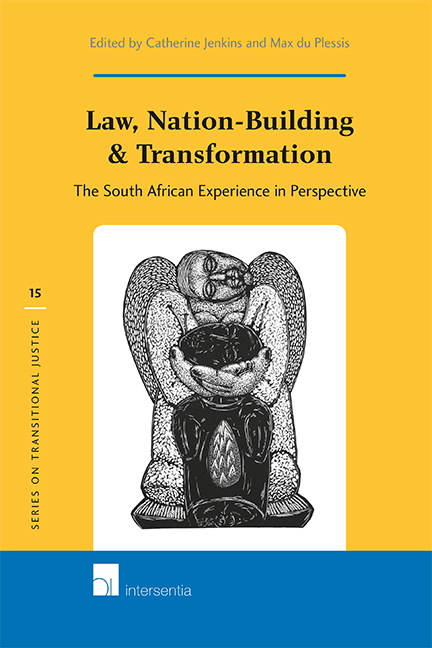Book contents
- Frontmatter
- Editors’ Foreword
- Contents
- Chapter 1 Transitional Justice: Lessons from South Africa?
- Chapter 2 Reflections on Post-Apartheid Nation-Building: Identity, Participation, Community
- Chapter 3 The Truth and Reconciliation Commission Process: A Retrospective
- Chapter 4 Rights at Work: The Transition to Constitutional Democracy and Women in South Africa
- Chapter 5 Crime, Policing and Nation-Building
- Chapter 6 Public Schools for Afrikaners in South Africa
- Chapter 7 Behind the Mask of the Rainbow Nation: The Limits of Law in Post-Apartheid South Africa
- Chapter 8 The Transformation of the Judiciary
- Chapter 9 Assessing the Social Transformation Performance of the South African Constitutional Court: From Totalitarianism to the Rule of Law
- Chapter 10 The Transformation of Land Law
- Chapter 11 The South African Presidency in Comparative African Context
- Chapter 12 Aspects of the Treatment of Freedom of Expression in South Africa’s Democratic Transition
- Chapter 13 Constitutionalism in Commonwealth Africa: Comparative Perspectives
Chapter 4 - Rights at Work: The Transition to Constitutional Democracy and Women in South Africa
Published online by Cambridge University Press: 16 December 2020
- Frontmatter
- Editors’ Foreword
- Contents
- Chapter 1 Transitional Justice: Lessons from South Africa?
- Chapter 2 Reflections on Post-Apartheid Nation-Building: Identity, Participation, Community
- Chapter 3 The Truth and Reconciliation Commission Process: A Retrospective
- Chapter 4 Rights at Work: The Transition to Constitutional Democracy and Women in South Africa
- Chapter 5 Crime, Policing and Nation-Building
- Chapter 6 Public Schools for Afrikaners in South Africa
- Chapter 7 Behind the Mask of the Rainbow Nation: The Limits of Law in Post-Apartheid South Africa
- Chapter 8 The Transformation of the Judiciary
- Chapter 9 Assessing the Social Transformation Performance of the South African Constitutional Court: From Totalitarianism to the Rule of Law
- Chapter 10 The Transformation of Land Law
- Chapter 11 The South African Presidency in Comparative African Context
- Chapter 12 Aspects of the Treatment of Freedom of Expression in South Africa’s Democratic Transition
- Chapter 13 Constitutionalism in Commonwealth Africa: Comparative Perspectives
Summary
INTRODUCTION
Can a transition to constitutional democracy benefit women? If so, in what ways? What do entrenched rights to equality, dignity, freedom from violence and reproductive choice mean in a society that is one of the most unequal in the world, with a high level of gender-based violence and patriarchal social attitudes? This chapter engages questions of constitutional democracy and human rights, not just in terms of the formal and quantitative measures so often used to advertise South Africa as a ‘women-friendly state’, but also in a more qualitative engagement with some of the struggles and compromises that shaped the formal victories, the boundaries that have been forged by rightsclaiming in the public sphere, and the manner in which women in civil society and the state have been able to engage the normative framework of rights to shape their public and private meanings and (possibly) to bring about changes in their own lives.
The chapter begins with a brief account of women and women's struggles in the apartheid state, followed by a discussion of the transition in the early 1990s and the political conditions and struggles that shaped the constitutional text. It suggests that the development of a constitution based on human rights and the primacy of (gender) equality was a profound advance for women, whose struggles were also able to establish gender equality as a significant indicator of democratic progress after 1994, and then to harness the language of equality and rights to push for a series of formal advances. The balance of this section briefly describes these legal and constitutional gains in Parliament and the courts and some of the limitations of these formal advances for women.
Two case studies are then presented to tease out the nature and scope of rightsbased transformation for women, to illustrate the extent to which women have been able to use rights to secure progressive ends, what has been achieved by this and to show how these rights remain subject to competing interests and social norms. The first, longer, case study looks at developments in culture and customary law, while the second considers reproductive choice.
- Type
- Chapter
- Information
- Law, Nation-Building and TransformationThe South African Experience in Perspective, pp. 91 - 122Publisher: IntersentiaPrint publication year: 2014



